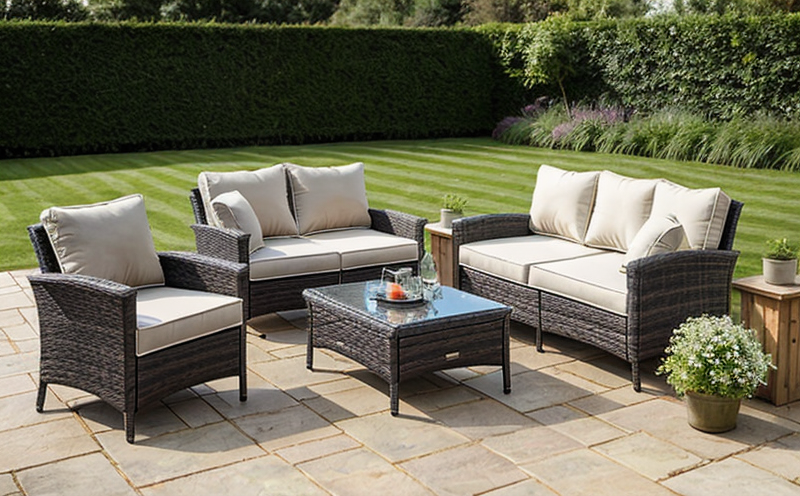NF EN 581 Outdoor Furniture Safety Mechanical and Durability Testing
The NF EN 581 series of standards is designed to ensure safety, durability, and mechanical integrity for outdoor furniture. Specifically, NF EN 581-4:2006 focuses on the mechanical and durability testing of outdoor furniture. This standard applies to various types of outdoor furniture including garden seating, tables, chairs, and other similar products intended for use both in public spaces and private settings.
The purpose of this test is to evaluate how well a piece of furniture withstands environmental factors such as sun exposure, rain, wind, and temperature changes. Additionally, it assesses the resistance of materials against wear and tear from continuous usage by customers. The tests aim at identifying potential risks that could lead to injury or damage during normal use.
To conduct these assessments accurately requires specialized equipment capable of simulating real-world conditions over extended periods. Common pieces used for testing include wooden benches, metal tables, plastic chairs, and composite materials. Each type presents unique challenges due to differences in composition and expected lifespan under various climatic regions worldwide.
The NF EN 581-4 protocol involves several key steps:
- Visual Inspection: Initial examination of the product looking for visible defects or manufacturing flaws.
- Mechanical Testing: Applying forces and pressures to simulate typical user interactions like sitting, standing up, or moving objects across surfaces. This includes static load tests which measure how much weight a particular component can support without failure.
- Durability Assessment: Exposure to harsh elements through environmental chambers that replicate different climates such as tropical heat, arctic cold, and high humidity conditions. These exposures help determine the longevity of materials used in outdoor settings.
The results from these tests provide critical insights into product performance which can then inform design improvements or material selection changes aimed at enhancing safety and reliability. Compliance with NF EN 581-4 helps manufacturers meet regulatory requirements while also building trust among consumers who value safe, long-lasting products.
For organizations involved in the production of outdoor furniture, adhering to this standard demonstrates a commitment to quality control and customer satisfaction. By ensuring compliance through rigorous testing procedures outlined in NF EN 581-4, companies can enhance their reputation within competitive markets where consumer safety is paramount.
Quality and Reliability Assurance
Implementing NF EN 581 Outdoor Furniture Safety Mechanical and Durability Testing ensures consistent product quality across different manufacturing batches. This consistency is crucial for maintaining brand integrity and customer trust. Through standardized testing methods, deviations from expected outcomes can be quickly identified allowing manufacturers to address issues before they become widespread problems.
Regular audits conducted by independent laboratories help maintain high standards of compliance ensuring that all products meet the specified criteria set forth in NF EN 581-4. These continuous checks foster an environment conducive to innovation and improvement, encouraging sustainable practices throughout the supply chain.
Incorporating this testing into product development processes allows manufacturers to anticipate challenges early on, leading to more robust designs capable of enduring challenging outdoor environments. This proactive approach not only improves overall performance but also enhances reputation among both internal stakeholders like R&D teams and external ones such as distributors and retailers.
International Acceptance and Recognition
NF EN 581 is recognized globally for its stringent requirements regarding the safety, durability, and mechanical integrity of outdoor furniture. The widespread acceptance of this standard among international markets makes it easier for manufacturers to export their products without encountering barriers at customs checkpoints or facing complaints from buyers due to non-compliance issues.
Many countries have adopted NF EN 581 as part of their national regulations, making compliance essential for businesses operating internationally. By ensuring adherence to these standards early in the design process, companies can avoid costly rejections and delays associated with failing inspections conducted by regulatory bodies abroad.
The interoperability provided by NF EN 581 also facilitates collaboration between local suppliers and overseas partners, fostering innovation through shared knowledge exchange. This interconnectedness strengthens global supply chains benefiting all parties involved in the production cycle from raw material sourcing to final product delivery.
Competitive Advantage and Market Impact
In today’s competitive landscape, demonstrating compliance with NF EN 581 can set a company apart by showcasing their dedication to producing safe, durable furniture. Consumers increasingly seek out brands that prioritize sustainability and user safety; thus, meeting these stringent requirements positions businesses favorably in the marketplace.
By investing time and resources into implementing comprehensive testing protocols based on NF EN 581 guidelines, organizations can differentiate themselves from competitors who may not adhere to such rigorous standards. This differentiation translates directly into increased sales volume as satisfied customers become repeat buyers or recommend products to others.
The positive impact extends beyond immediate financial gains; it also contributes positively towards long-term brand loyalty and community engagement initiatives aimed at improving public spaces through high-quality, reliable furniture solutions. Such efforts resonate well with eco-conscious consumers who appreciate companies contributing positively to society while delivering excellent value for money.





